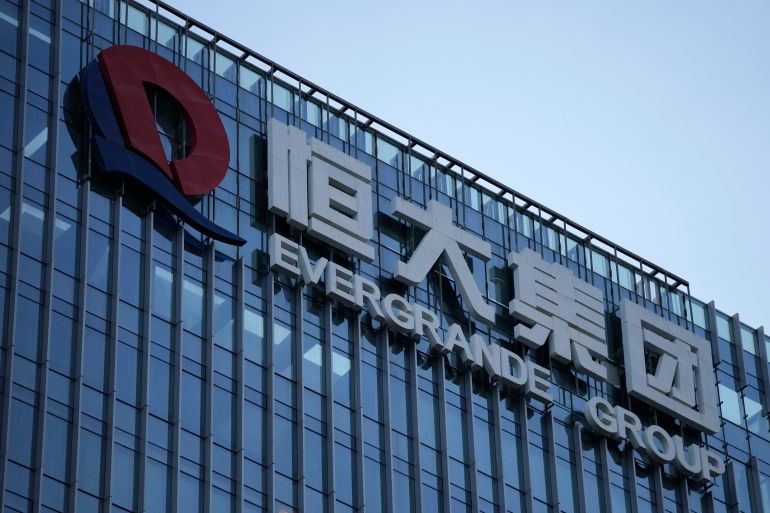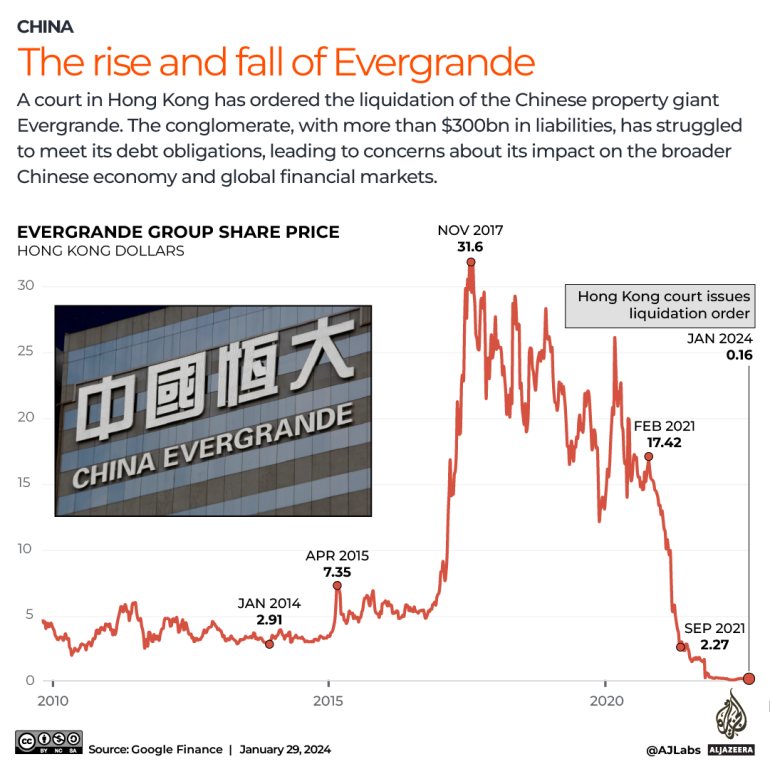China’s property giant Evergrande ordered to liquidate as debt talks fail
Hong Kong court orders developer to wind up after finding company has no viable restructuring plan.

China’s troubled real-estate giant the Evergrande Group has been ordered to liquidate, a move that could deal a new blow to confidence in the world’s second-largest economy.
A Hong Kong court made the ruling on Monday after the company failed to convince a judge it had a workable plan to restructure some $300bn in debts.
Keep reading
list of 4 itemsUK says it thwarted Houthis’ drone attack in the Red Sea
Why is Benjamin Netanyahu lashing out at Egypt, Jordan and Qatar?
Russia-Ukraine war: List of key events, day 705
“It would be a situation where the court says enough is enough,” judge Linda Chan said. “I consider that it is appropriate for the court to make a winding up order against the company, and I so order.”
The ruling follows 18 months of legal wrangling after creditor Top Shine, in 2022, filed a petition to wind up the developer in a bid to recoup its losses.

Evergrande, the world’s most indebted developer, had been granted a brief reprieve in December after arguing it needed time to refine its restructuring plan.
Chan said the court had in December “made it very clear it expected to see a fully formulated and viable proposal”.
Evergrande Executive Director Shawn Siu called the ruling regrettable but said the group would do “everything possible to safeguard the stability of its domestic business and operation”, which he said is independent of its Hong Kong arm.
Evergrande’s default on repayments to international investors in 2021, after Beijing began cracking down on excessive borrowing for real estate, sent shockwaves through China’s property sector, which accounts for an estimated 15-30 percent of the economy.
More than 50 Chinese real-estate developers have defaulted or missed payments during the past three years, according to credit ratings agency Standard and Poor’s (S&P).
Hong Kong-listed shares in Evergrande plunged by more than 20 percent following the ruling on Monday, before the city’s stock exchange halted trading in the stock.
The move is the latest in a series of warning signs for China’s $18 trillion economy, whose post-COVID recovery is facing challenges ranging from crackdowns on private industry to a declining population and an exodus of foreign capital.
China’s official gross domestic product (GDP) growth of 5.2 percent last year was the worst performance in decades, excluding the COVID-19 pandemic.
“Evergrande’s liquidation will pose more challenges to itself and other developers, but it will only have a limited impact on the already battered property sector and the macroeconomy,” Gary Ng, an economist at Natixis in Hong Kong, told Al Jazeera.
“Household sentiment is already very cautious of units from troubled developers, and it is unlikely to worsen further. However, it may still delay the recovery of the home market and the weaker confidence may linger longer.”
After Monday’s ruling in Hong Kong, the fate of Evergrande’s asset sheet is uncertain.
While China signed an agreement with Hong Kong to recognise insolvency and restructuring proceedings in the Chinese cities of Shenzhen, Shanghai and Xiamen, it is unclear whether mainland courts would sanction liquidators seizing the developer’s assets in the country.
Hong Kong’s common law system, adopted during the British colonial era, is distinct from China’s Communist Party-controlled courts.
In 2021, a Shenzhen court recognised insolvency proceedings in Hong Kong for the first time when it accepted the standing of liquidators for the paper manufacturing firm Samson Paper.
“As most of Evergrande’s assets are in mainland China, there are uncertainties about how the creditors can seize the assets and the repayment rank of offshore bondholders,” Ng said.